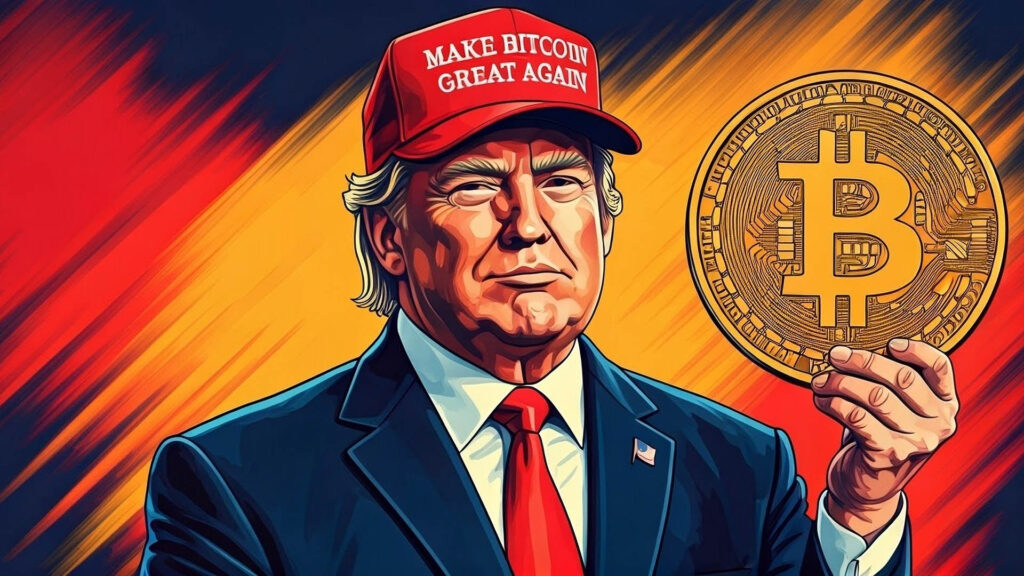Bitcoin has breached US$100,000 for the first time, propelled by “Trump pump” optimism surrounding the President-elect’s crypto-friendly policies.
The cryptocurrency, the largest by market value, climbed to US$102,510 on 5 December, marking a 45% rise since Trump’s election victory in early November. It’s currently trading around US$99,000.
Trump’s pro-crypto stance
In July 2024, during the Bitcoin 2024 conference in Nashville, Tennessee, Trump pledged to make the United States the “crypto capital of the planet”. In return, he received substantial financial support from figures in the cryptocurrency industry.
Elon Musk’s attitude toward crypto has generally been enthusiasm for its potential. He has championed specific coins like Bitcoin and Dogecoin. In early 2021, Tesla purchased US$1.5bn of Bitcoin, and briefly accepted it as payment for vehicles. However, Bitcoin payments were suspended shortly afterwards.
Recently, Trump announced plans to nominate cryptocurrency advocate Paul Atkins as Chair of the Securities and Exchange Commission. Trump praised Atkins as a “proven leader for common-sense regulations”.
On his social media platform, Trump has declared: “Digital assets & other innovations are crucial to Making America Greater than Ever Before.”
A “carnival atmosphere”
Jason Titman, CEO of crypto brokerage Swyftx, noted that global trading volumes are exceeding mid-pandemic levels. “The nomination of Paul Atkins as SEC chair just added to the carnival atmosphere,” he told Bloomberg.
Bitcoin’s historic rise has also benefited from end-of-year trends. Kyle Rodda, a senior analyst at Capital.com, highlighted Bitcoin’s past year-end rallies, suggesting that this current surge could extend further under the incoming administration.
Critics
Warren Buffett has called bitcoin a “gambling token”. “[Bitcoin] doesn’t have any value, but that doesn’t stop people from wanting to play a roulette wheel”.
Bill Gates has commented that crypto is “100%” based on greater fool theory.
Critics warn of environmental concerns from energy-intensive mining and regulation risk. In 2021, China declared all cryptocurrency transactions illegal.
The inherent volatility of the asset is also something investors have to be prepared for. On 12 March 2020, Bitcoin’s price fell nearly 40% in a single day, triggered by COVID-19. In June 2017, Ethereum briefly fell from US$319 to US$0.10 within seconds on GDAX (now Coinbase Pro) due to a large sell order and subsequent cascading stop-loss orders.
Regulation
Bitcoin’s rise past US$100,000 is seen as a milestone toward mainstream acceptance. The cryptocurrency has endured multiple crashes and “crypto winters”.
Australia’s stance on cryptocurrency is evolving, with regulators working to balance innovation with investor protection. The Australian Securities and Investments Commission has been increasing its oversight, proposing licensing requirements for cryptocurrency exchanges and firms promoting digital assets. This potentially includes treating stablecoins and certain tokens as financial products, requiring compliance with strict regulatory standards.
In contrast with the US move towards crypto-friendly regulation, Europe is adopting a cautious stance. The European Union’s recently introduced Markets in Crypto Assets Regulation (MiCA) aims to mitigate risks associated with cryptocurrencies. Fabio Panetta, governor of Italy’s central bank, criticised crypto-assets like Bitcoin as speculative and volatile, with “no intrinsic value”.

